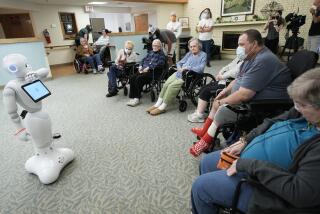Readers React: Back to the future on healthcare
I totally agree with Dr. Mindy Fain. Home is where the heart is. (“Want better healthcare? Have doctors make house calls.,” Opinion, June 4)
People feel more at ease when they are at home with their family members rather than being in the strange environment of a hospital. This psychological effect can help people recover faster and can reduce hospital-acquired infections. Also, this way we don’t have to deal with hospital readmission.
The United States has the most expensive healthcare system in the world, constituting more than 17% of the nation’s gross domestic product. But at the same time, we have some of the worst outcomes among industrialized nations.
Can home care be a way to reduce high hospital costs and lighten the overall healthcare burden? I am optimistic.
Sanjay Bhandari, MD
Milwaukee
Fain suffers from “ivory toweritis,” an affliction at academic medicine centers based on flawed government policy.
The new accountable care organizations (ACOs) that Fain says should have home care programs are the latest iteration of health maintenance organizations (HMOs), which are well known for delayed and denied care. HMOs have failed to control healthcare costs, as will the ACOs. The only affordable healthcare system mandates price controls and elimination of the profiteers.
In the good-old days, I made house calls when necessary, but that was at a time when physicians could practice without the total encumbrance of the government.
What we need now are physicians standing up and saying, “I’m fed up and I’m not going to take this any longer.”
Jerome P. Helman, MD
Venice
My mother was 96 when she experienced chest pains and called her doctor, who came to her house within the hour.
He called an ambulance to transport her to the hospital, where she spent the next four days in intensive care and the following two weeks in a recovery ward. An ambulance then transported her home and a nurse visited her once a day for the next month to provide ongoing care.
My mother paid nothing for this. She had the good fortune to live in Australia, where cradle-to-grave healthcare is paid for by a government single-payer system that costs less than half what Americans pay for healthcare per person.
More to the point, the value of proactive instead of reactive healthcare is known. It’s kept my mother living to 98.
Laurie Pane
Burbank
More to Read
A cure for the common opinion
Get thought-provoking perspectives with our weekly newsletter.
You may occasionally receive promotional content from the Los Angeles Times.






